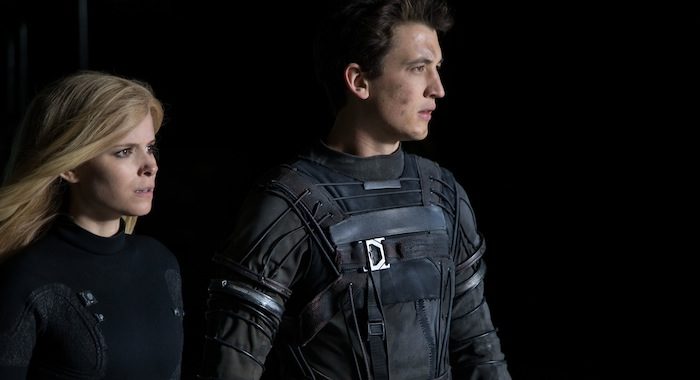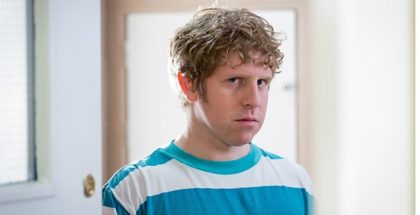One Year on: The prophetic failure of Josh Trank’s underrated Fantastic Four
David Farnor | On 06, Aug 2016
One year ago today, Josh Trank’s Fantastic Four was released in UK cinemas. As you are no doubt already aware, it didn’t go down well. But in hindsight, there’s much to appreciate in this underrated reboot, whether intentional or not.
“He’s scared, Harvey. They’re just scared kids,” Dr. Storm (Reg E. Cathey) growls at Tim Blake Nelson’s government agent, Dr. Allen. “We don’t know what they are right now,” comes the reply. “All we know is that they are dangerous and powerful, which makes them extremely valuable to the guys who run this place.”
It’s the kind of on-the-nose dialogue that might be considered a sign of an inexperienced writer-director at the helm of a major franchise movie, but it also strikes at the heart of what’s special about Trank’s movie.
“Trank’s movie”, of course, is a phrase that may not be very apt, after Fox famously stepped in and interfered with the final film. Just as it was released, the director memorably took to Twitter to announce that there was a “fantastic version” of the film that he had made and that audiences would “probably never see” it. The tweet was deleted, but Trank was, at the time, lined up to direct a Star Wars film. He was shortly no longer part of the Lucasfilm universe.
Details of conflicts on set and Trank becoming very withdrawn in the face of meddling producers emerged in the weeks following the box office carnage. The Hollywood Reporters’ Kim Masters reported that Fox, at first, apparently left Josh to it, ironically enough because “the studio was trying to shake off its reputation for micromanaging filmmakers”.
But while it may have bought into the idea of a darker reboot at first, that eventually changed as producers sought to protect their brand from something that they felt would damage it. Producer Simon Kinberg and others hastily whipped something else together.
So what, exactly, did Fox supposedly object to?
Trank’s script (co-written with Jeremy Slater and Simon Kinberg) notably skewed the tale younger than before, presenting us with a millennial Reed Richards (Miles Teller), who creates a teleporting device in his garage with his friend, Ben (Jamie Bell). Teachers laugh them out of the school science fair, but Dr. Storm recruits Reed’s prodigious talent to work on a Quantum Gate for the private Baxter Institute. There, Reed meets Dr. Storm’s wayward son, Johnny (Michael B Jordan), and his adopted daughter, Sue (Kate Mara).
It’s a diverse ensemble, reflective of a more modern society than the all-white Fantastic Four of old – and the diversity continues, as Reed calls up his old friend from the grimy projects to come to the posh building and share in the first human test of the machine. Heck, in a tiny detail that one of the film’s rare defenders also notices, Reed even knows the name of the security guard manning the building. This isn’t quite the by-the-numbers formula, or the by-the-numbers characters, you’ve been conditioned to expect from a familiar origins tale. When Sue gets out her generic fruit-based listening device, she listens to Portishead, rather than the latest pop sensation to top the charts.
But the real departure from convention occurs after they hop over to another dimension and back again – and, due to a catastrophic accident, find themselves radically transformed. The reveal of their powers isn’t played for laughs, a la Spider-Man, or even for cool spectacle, a la X-Men, but for internalised, claustrophobic shock; in a way, this is more a horror movie than a blockbuster. Reed’s limbs stretch at unnatural angles, while Johnny isn’t merely a human torch: he’s on fire.
“Does it hurt?” asks Reed of Ben, now a gravely, hulking, scraping rock monster (The Thing). “I’m used to it,” comes the gritted reply.
It’s a radical take on the usual evolution from human to super-human, one that echoes Trank’s impressive debut, the similarly downbeat Chronicle. That revelled in the thrill of young people discovering their potential by flying through the air – and it’s a theme that Trank continues here, as these people attempt to find their purpose and place in a now-super-powered universe. Is it in becoming weapons for the government? And if they do it voluntarily, does that make them complicit, or controlled?
“You said I had the potential to be something important. Who’s to say this isn’t it?” Johnny tells his father, who, like Ben, welcomes a sense of acceptance. “You have no idea what they are planning to do to you,” says Dr. Storm. “They’re not doing anything to me, I’m doing it for them!” he retorts.
It’s no coincidence that their transformation happens not because they’re sent dimension-hopping by force, but because the teens drunkenly decide on a whim not to have corporations and governments profit from their work without them getting to use it first. A bold first act rolls into a montage of individual coping mechanisms, as the film refuses to let us have our cookie-cutter team-bonding moment until the finale. When that showdown with Victor Von Doom (Toby Kebbell) comes, his motivation is to take the planet away from the humans who have wasted it. It’s too late for the old folks. Now, there’s a new generation in town.
There’s no denying that there are some beats missing in the second half of the story, but it’s oddly refreshing to have a superhero flick that’s so low-key it only really has one action sequence. How intentional that is on Trank’s part isn’t clear – according to Collider’s sources, three big set pieces were removed by Fox. Kebbell, certainly, deserved more screen-time, partly to show off his excellent skills, and partly to showcase his nifty, green, luminous costume design; another dark spin on a world of primary coloured spandex.
The end result clocked in at well under two hours – and, excluding the end credits, almost hit the 90 minute mark. Compare it to the usual tentpole fare of today and you’ve got a brief, bold and often visually impressive blockbuster, all served at a brisk pace and a brazenly chilled temperature. (The movie is far from the worst movie ever made – and certainly has more identity than either of Tim Story’s early-2000 efforts.) But with its script cut and pasted, some fans already annoyed by Jordan’s casting and Trank fanning the flames of rumoured on-set awkwardness, the film ultimately crashed and burned, possibly taking the director’s reputation with it. (Kinberg, on the other hand, remains a studio stalwart with clear skills at navigating difficult waters; he’s since produced The Martian, X-Men: Apocalypse and more.)
“To me, it is a classic indictment of the entire system,” one crew member observed, as the rubble began to cool.
One year later, all this might be sounding familiar, as Suicide Squad hits cinemas. Like Fantastic Four, which raced into production to stop Fox’s rights to the characters defaulting back to Marvel, Warner Bros. had already decided on a deadline for its DC flick. Like Fantastic Four, the resulting production was plagued by reports of interference. And like Fantastic Four, the reception hasn’t been great.
Ayer, who proved his mettle with Fury alone last year, was reportedly given just six weeks to write his script, while the film was supposedly recut by none other than the people who edited its buzz-worthy trailer. (Like Four’s mooted action sequences, many of Jared Leto’s scenes as The Joker were apparently taken out of the film, leaving potentially gaping holes where his character development might have been.)
This, of course, isn’t the first time it’s happened. World War Z famously reshot its final act to feature a detour to Wales. Decades ago, the DGA even had a pseudonym (Allen Smithee) for filmmakers to use when directors wanted to disown a film. Alas, that wasn’t available for David O’Russell, when his film Accidental Love was released last year on VOD – despite being a completely recut version of an unreleased film he made five years before.
There are filmmakers that can thrive in such conditions. On The Bourne Identity, producer Frank Marshall stepped in late on, when director Doug Liman struggled to meet a release date that had already been pushed back, as well as studio pressure for a more conventional actioner. Liman has since praised Damon for helping him through, the franchise has blossomed, while his career as a director has continued with no repercussions for his reputation. David Fincher, meanwhile, was burned by Aliens 3, but has since gone on to forge an idiosyncratic (and still successful) career defined by his determination to have final cut. More recently, Joss Whedon and JJ Abrams have both delivered huge commercial triumphs for The Avengers, Star Trek and Star Wars, while the Russo brothers managed to please everyone with the unsurprising, but still entertaining, Civil War.
But that’s part of the problem too: we end up with blockbusters that are often all too similar to one another, particularly in the case of superhero films. Other sci-fi flicks, such as Jeff Nichols’ Midnight Special (out on DVD, Blu-ray and VOD on Monday 8th August), are made outside of that system and produce something beautifully unique, but not necessarily financially successful.
Nichols, like Colin Trevorrow, who helmed Safety Not Guaranteed before being given the keys to Jurassic World, or Marc Webb, who directed (500) Days of Summer before leaping onto The Amazing Spider-Man, told Den of Geek that he’s thought about the idea of trying something bigger.
“I have a bit of a competitive spirit, but also I just want to see… I want to make a big movie. I want to see what it’s like. And maybe it’ll just rip me to shreds, you know, emotionally? And maybe critically, who knows. Because once you start to move up to bigger films, you have to start taking into account the point of view of the investors and the studio,” he said in an interview.
“I think I maybe have an opportunity to talk to people about spending more money on a film that has the right cast and idea and all those things, and maybe be trusted a little bit. I think maybe I’ve earned that – I’m not sure.”
It’s a position that many filmmakers have been in, and many more (particularly in a post-YouTube age) will continue to be, as big studios seem increasingly keen to build their franchise universes as quickly as possible – and to bring on relatively small directors who might be more flexible to doing it the way the studios want.
So where does that leave Fantastic Four? An underrated, yet flawed, film, it’s become something of a prophetic failure, a tale of young talents and suited giants, of compromises and conflicts, of cut scenes and closed doors.
“We don’t know what they are right now,” says Dr. Allen, of this astonishing group of upcoming heroes. “All we know is that they are dangerous and powerful, which makes them extremely valuable to the guys who run this place.”
Fantastic Four is available on Disney+ UK, as part of a £7.99 monthly subscription or a £79.99 yearly subscription.
Where can I buy or rent Fantastic Four online in the UK?




















